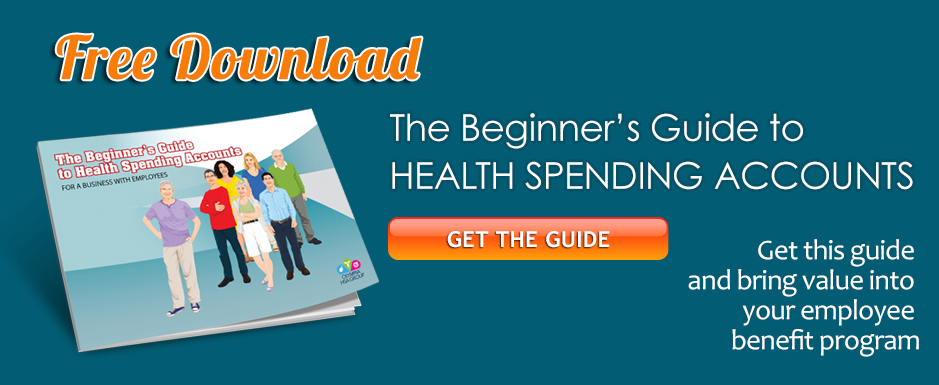If you are undecided about introducing employee benefits into your small business or just want to know a little more, than this article is for you.
At the end of the day, employee benefits are an investment into your employees. Like all investments, you want to see a return. To add onto that analogy, you can’t expect great investments to appear overnight, so don’t expect the same of employee benefits either.
The first topic of discussion after a new hire is employee benefits. That's because a competitive benefits package is important. In fact, they can be worth more than a salary raise when utilized properly. Generally, a top tier benefits plan means an easier time recruiting and retaining top talent.
Discover the importance of employee benefits for a small business:
1. Employee Benefits vs. Salary Raise
You might not believe it, but let's think for a second: employee benefits is a broad term with many categories. It can range from working at home to tax-free health and dental benefits.
Everyone has different motivations. If I'm an employee with dependant children, then the tax-free money I receive under an Health Spending Account can could be worth more than an increase in (taxable) income.
As an another example, let's compare the benefit of telecommuting to a monetary gain. The time saved by avoiding a lengthy commute (let's say 1 hour), could be worth more than an increase in wages.
These are specific examples, but help to show how employee benefits can outshine a salary raise. It is important to take the employee's perspective.
According to a Harvard Business Review article, employees place high value on many affordable employee benefits such as flexible schedules and telecommuting. Additionally, the study found that competitive benefits can offset a candidate's decision to accept another job offer, even when the salary is higher.
2. Negotiation
It's no surprise that employee benefits are a trending topic. Within the past decade, the term has exploded onto the recruitment scene. Every benefit you offer serves as a perk when negotiating with a potential candidate. Hiring is a game of 'give and take'. If you don't offer any benefits, then money is the only thing on your side of the table.

3. Employee Engagement and Morale
Offering a comprehensive benefits plan shows that you understand and respect your employees and their needs. Health benefits show that you care about the well being of the employee. Perks like flexible hours, paid vacation, and telecommuting shows that you understand the importance of a work-life balance.
Everyone knows a happy and healthy employee is a productive one. Health benefits can improve the efficiency and productivity of employees in the long run. Annual dentist or health checkups can prevent unexpected time off, which in turn, allow employees to spend their vacation days how and when they want. This translates back to a better work environment.
4. Work Environment
It promotes a collaborative and positive work environment. Benefits like off-site social events or gym memberships promote cross-departmental collaboration and team-building within your department. These are things that your employees come to share, and these experiences can last forever. It builds back on your brand image in the eye's of your stakeholders - employees.
Like any other aspect of business, you can utilize your employee benefits to shape your brand. Within the fitness and health industry, many companies choose health-related benefits. It makes sense because it relays their company values.
The main takeaway is that employee benefits works in conjunction with your company culture. It can build on your company culture or vice versa. For example, introducing health benefits can promote health and wellness within your company culture.
5. Retain Employees
An employee benefits program exists to attract and retain employees. So do just that! Invest in your number one asset, employees. Provide training programs, seminars, and opportunities. Remember, an investment in your employees is one that goes back into the company.
Every hiring manager understands the lengthy turnaround of a new hire. It's usually more efficient to retain (or retrain) a current employee rather than find a new one. With that said, it can be difficult for small business to prevent the loss of top talent to larger firms. The best way around this is to offer a personalized and flexible benefits package. This ensures you are getting the maximum return on your investment. This bring us to our next point, creating bonds with employees.
6. Meet your workers
Employee benefits can serve as an opportunity to get acquainted with your workers. Remember, communication is key. Before every decision, we should address the stakeholders. Employees are always keen to offer their opinion, especially on an important topic such as benefits. When you incorporate their opinion into the final decision, it also lets them know that you care. I’m sure most people would prefer a personally selected list of benefits over a pre-existing template.
Employees are often a company’s greatest asset, so why not treat them as such. Furthermore, they can be great brand ambassadors. Not only will they refer your products, but also your brand image, which can lead to talented recruits down the line.
7. Hiring Advantage (over big business)
Small business is known for it's family feel. That's because most workers at small business treat one another like family. Leverage your advantage as a small business and show that you care about your employees by offering well-suited benefits like a comprehensive health package.
8. Affordable and Effective
It's no surprise that there are literally thousands of benefits to choose from. If one provider is not offering the services you want, there are a thousand others who are competing for your business. Find the employee benefits that match your business, and you'll find that they can actually be quite affordable.
This doesn't mean choose the cheapest one! Choose the one which brings the most value and fits into your employee's mindsets.
Here are some popular options:
- Employee referral bonus program
- Flexible health benefits like a Health Spending Account
- Policies regarding discrimination, harassment, and whistle-blowing
- Flexible dress-code
- Limits to overtime work
- Yearly review/promotion panels
- Retirement plans
- Off-site social events
- Training and education reimbursement
If you are an employer thinking about employee benefits, it’s a step in the right direction... but remember, it is only useful when done right. A top tier benefits program requires proper execution and planning, both administratively and financially.
Don't forget - you have the freedom to find a suitable provider/carrier and broker/agent of these benefits. In some cases, it is not necessary to enlist through a broker. It can be money down the drain. Remember to do your due diligence, and consult with an expert where needed.
Learn how a Health Spending Account can improve your employee benefits program:
